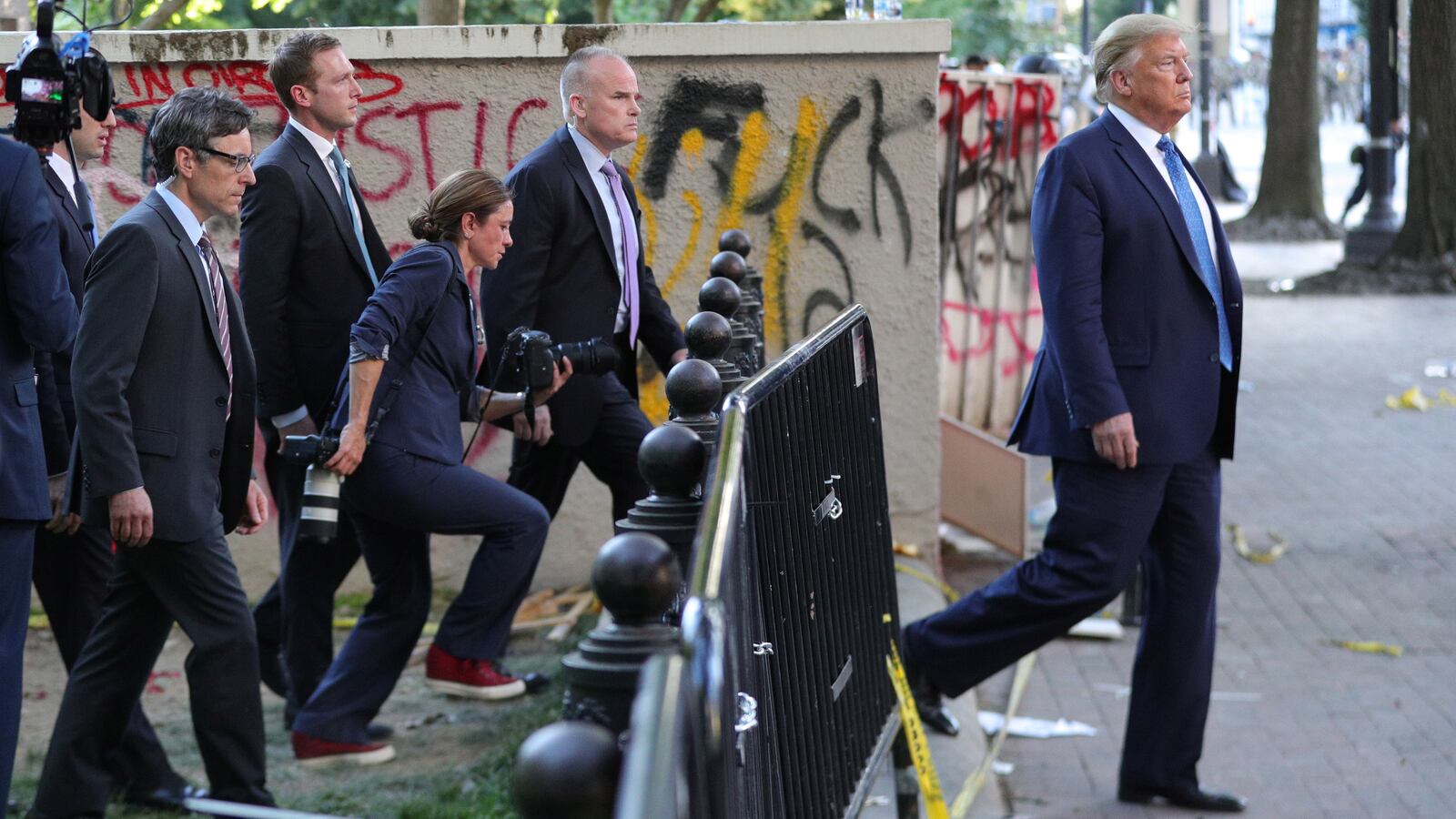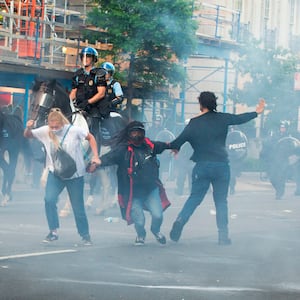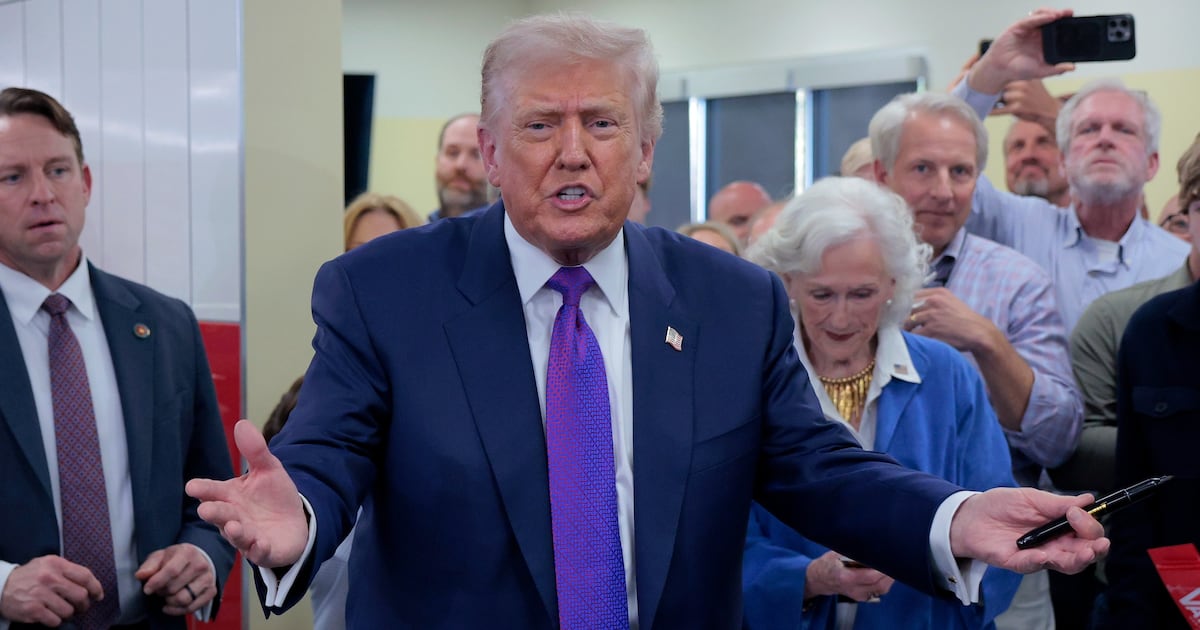“American history isn’t a fairy tale,” Joe Biden said from Philadelphia City Hall Tuesday morning. “The battle for the soul of this nation has been a constant push and pull for 240 years. At our best the American ideal wins out. But it’s never a rout. It’s always a fight.”
It is, and maybe more people are joining it. I’ve noticed something interesting on my Facebook feed over these recent harrowing days. A number of people I have known for many years who aren’t usually very political—and more interestingly, some who are political but are conservative—have been posting statements in support of justice for George Floyd’s family. Even expressing outrage over his death and condemnations of police brutality.
Just an anecdote, but I think it means something—that Floyd’s death, and the context in which it occurred, may represent some tipping point where we as a nation collectively see the nature of an injustice in a way we didn’t before. Perhaps it’s the accumulation of all these police shootings and beatings we’ve seen in recent years on cable news. Eventually, the indifferent or even hostile heart and mind succumb to the evidence.
When I wrote “people” above, I meant mostly white people, I realize; but that’s significant. If white people who aren’t social-justice types are finally imagining what it’s like to have to fear getting killed or having your children killed for a minor transgression or no transgression at all, that’s a good thing. That’s how the world improves. That’s empathy. More importantly, it’s civic empathy.
Empathy is being able to imagine what another is experiencing. But civic empathy is something more—it’s being able to imagine another’s experiences as a member of society, and how the rules of the society affect that person. Civic empathy is the soul of democracy, especially a democracy as multi-ethnic as ours. In a largely homogeneous society, civic empathy is easy; indeed it doesn’t even come into play, because if everyone else is like you (racially, religiously, etc.), you don’t have to use your imagination at all.
But when people are different, civic empathy is vital. Civic empathy enables us to imagine—as white people, say—what it’s like to be a black man driving home who doesn’t come to a full stop at a stop sign and sees a police light in his rear-view mirror. For a white man, that’s an annoyance. For a black man, it could end in death. When enough white people accept that reality, then we’ve located a moral intersection of shared interests. Then, we move forward. And we understand that doing so is the best face of America, representing our best moments.
Meanwhile, in the White House, we have a president who isn’t just uninterested in civic empathy. He is its enemy. He regards it as a weakness. A lie. It’s important to understand this. Normal conservative Republicans still believe in a version of civic empathy. It’s not the same form that liberals embrace, because the conservative’s innate suspicion of too much change places limits on what kinds of policy responses they’ll support. But when George W. Bush visited that mosque after 9-11, at least he was embracing the premise that our democracy needs empathy, especially at the most challenging times.
We’re in a challenging time now—more so, I’d say, than after 9-11, because far more have died and we don’t know when this will end. And then, on top of the pandemic, comes the violence. And Trump’s response is to declare war on empathy. Oh, he talked a little bit about George Floyd, and he says, with all the feeling of a hostage reading a statement, that he is the ally of peaceful protesters. But his real message is unmistakable.
His real message is force. It was well summed up in the word “dominate,” which he used to the governors in that phone call Monday. “Dominate” is not an empathetic word, to put it mildly. It’s not even a democratic word. Democracies don’t dominate their own people; even lawless looters. No, “dominate” is a fascist word. Dominate is what an anti-democratic majority does to its minority, whether that minority is blacks, Jews, Muslims, Kulaks, Christians, intellectuals, whatever.
And it’s obvious that Trump is just itching to have an excuse to send some federal troops somewhere—preferably, in his fascist brain, to a place where there’s a Democratic mayor and a Democratic governor.
Trump may be the president. But he is not America. We have, thankfully, many other political leaders who are stepping forward who are America. Some of the governors, like Pritzker and Whitmer and Cuomo. Some Republican governors, too, like Hogan and DeWine and Baker. And some other Republicans have begun to pay more lip service to racial justice—Ted Cruz, Lindsey Graham. Not enough of them, though—certainly not Scott Walker, who with that sick tweet Monday night showed that he was ready to try on a brown shirt for size. Bishop Mariann Budde of Washington, who spoke so powerfully about Trump appropriating a historic church for a photo op that he actually thought made him look strong but was the exact opposite, is America.
And Joe Biden, God bless him, is America, too. You don’t have to love him, fine. But if you watched that speech, you saw a patriot, and a person who really understands the importance of values like empathy and humility to the functioning of a democracy.
If I become president, I won’t get everything right, he said, “but I promise you this. I won’t traffic in fear and division.” Because “that’s what the presidency is. The duty to care. To care for all of us. Not just those who vote for us, but all of us.”
And finally, those folks on Facebook are America, too. And they’re the ones who matter most, because for all our problems, we are still enough of a democracy that what the people believe matters, and if enough people believe it’s time to deal with this horror of police violence against black citizens, we will, eventually, deal with it. It won’t be “solved,” but we will reach the point where defending it is unacceptable and where, finally, it is punished. We’ll reach a democratic consensus on behalf of civic empathy.
The president will exist outside that consensus. Alas, I’m sure some of those Facebook posters I saw will still be Trump voters. But some won’t be. Some will connect the dots between the physical violence we saw in Minneapolis and the rhetorical violence Trump suffocates us with every day. I believe with all my heart that a majority of Americans don’t want to be suffocated. We don’t want Donald Trump’s knee on our necks. We want to breathe.







